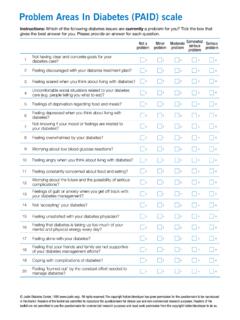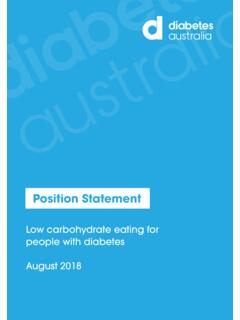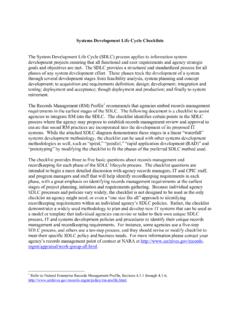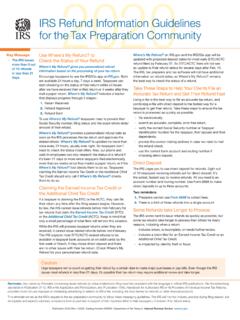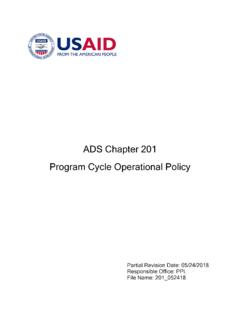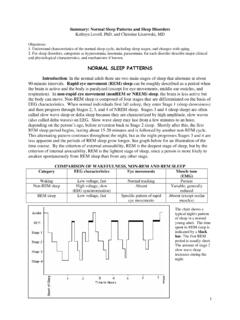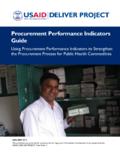Transcription of Your diabetes annual cycle of care - Diabetes Australia
1 1300 136 588 The National Diabetes Services Scheme is an initiative of the Australian Government administered with the assistance of Diabetes Diabetes annual cycle of care The Diabetes annual cycle of care is a checklist for reviewing your Diabetes management and general health. Your general practitioner (GP) will do this review to help you and your health professionals manage your Diabetes , and to reduce your risk of Diabetes -related s important to do an annual cycle of care to identify any health concerns early and discuss the best treatment with your doctor and Diabetes health professionals. Without regular checks, Diabetes can lead to complications that can affect your whole body, including your kidneys, eyes, feet, nerves and heart. The annual cycle of care includes the following health checks:HbA1c This blood test reflects your average blood glucose level over the last 10 to 12 weeks. This should be done at least every 6-12 months, or more often if required.
2 The general recommendation is to aim for a reading of 53mmol/mol (7%) or less, but it s important to discuss your individual HbA1c target with your doctor or Diabetes educator. Blood pressureBlood pressure should be checked by your GP or practice nurse at every visit or at least every six months. As a general guide, the target for people with Diabetes is 130/80 or less. If you have existing cardiovascular or kidney disease, your doctor will advise you on a blood pressure target to meet your individual health needs. Research has shown that keeping blood pressure on target decreases the risk of stroke, heart, kidney and eye disease, and nerve damage. Foot assessment A foot assessment should be performed by your GP, Diabetes educator, practice nurse or podiatrist to check the blood supply and feeling in both of your feet. If your feet have been assessed as low risk you should have a foot assessment every year.
3 If your feet have been assessed as intermediate or high risk you should have a foot assessment at least every 3-6 Diabetes annual cycle OF care 2 of 4 Daily foot care is essential. Get to know your feet and check them every day. If you can t reach your feet, you can use a mirror or have someone look at them for you. For more information about how to look after your feet, talk to your GP, podiatrist or Diabetes health professional. You can also ask your GP if you are eligible for a management plan to see a podiatrist under examination Damage to the small vessels in the back of your eyes can occur without you knowing. That s why it s essential to have your eyes checked regularly by an optometrist or eye specialist (ophthalmologist) for Diabetes -related damage. It is recommended that this is done every two years (unless recommended more often). If you do notice any changes in your vision, it s important to contact your doctor or eye specialist as soon as possible.
4 Kidney health If your blood pressure and blood glucose levels remain high over time, this can increase the risk of damage to your kidneys (diabetic nephropathy). Every 12 months, your GP or endocrinologist will arrange a urine test to check for small amounts of protein in your urine (called microalbumin). A blood test to assess your kidney function is also recommended. Blood fats (cholesterol and triglycerides)Healthy cholesterol and triglyceride levels will reduce your risk of Diabetes -related complications. Your doctor will check your blood fats. As a guide aim for: Total cholesterol less than 4mmol/L LDL (bad) cholesterol less than 2mmol/L HDL (good) cholesterol 1mmol/L or above Triglycerides less than 2mmol/LWeight, waist and body mass indexIf you are carrying extra weight, losing even a small amount of weight (5 10%) will help reduce your blood pressure, blood glucose and cholesterol levels. One way to assess your weight is by using the Body Mass Index (BMI).
5 This measures whether or not you are in the healthy weight range. It s calculated by dividing your weight in kilograms (kg) by your height in metres squared (m ). A BMI between and is within the healthy weight waist measurement is also an important indicator of your health risks. The recommended waist measurement is less than 94cm for men and less than 80cm for targets are for people from European backgrounds. Different target ranges may be used if you are from Asian or Pacific Islander backgrounds. Speak to your doctor or Diabetes health professional about the BMI target that is right for eating Following a healthy eating plan will help you achieve the best possible blood glucose and cholesterol levels, and help you manage your weight. You can also ask your GP if you are eligible for a management plan to see a dietitian under Diabetes annual cycle OF care 3 of 4 Physical activity Be physically active.
6 For good health, aim to do at least 30 minutes of moderate physical activity (such as brisk walking, swimming or cycling) on most, if not all, days of the week. The best activity is one that you enjoy and that gets you moving. It s also important to limit the amount of time spent sitting and being sedentary. Your level of physical activity will be reviewed as part of your annual cycle of care . An exercise physiologist can develop an exercise program that is right for you. Ask your GP if you are eligible for a management plan to see an exercise physiologist under Medicare. Medication review A review of your medications can help make sure the combination of your current medications is safe and that the doses are right for you. If you are on more than three medications, you may be eligible for a Home Medication Review. This would involve the pharmacist of your choice conducting a thorough review of your medications in your own home.
7 Ask your GP for more information. Smoking If you are a smoker, quitting can help reduce your risk of Diabetes -related complications and improve your overall health. Some people find it hard to quit, so if you feel you can t give up smoking on your own, ask for help talk to your GP or call the Quitline on 137 managementYour doctor and Diabetes health professionals will review your overall Diabetes management and provide advice on how to keep your Diabetes on track. Emotional healthYour emotional health is also important. If living with Diabetes is making you feel anxious, distressed or is getting you down, discuss how you are feeling with your Diabetes health professionals. They can help you access the support you need. GP management plan A GP management plan can help you manage your Diabetes by providing an organised, written approach to your care . These plans allow you to receive a Medicare rebate when seeing health professionals, such as Diabetes educators, dietitians, podiatrists and exercise physiologists.
8 For more information about GP management plans, talk to your GP, Diabetes educator or practice NDSS and youThis factsheet is intended as a guide only. It should not replace individual medical advice and if you have any concerns about your health or further questions, you should contact your health NDSS provides a range of services to help you manage your Diabetes . These include our Infoline and website for advice on Diabetes management, NDSS products and a range of support programs to help you learn more about managing your Diabetes . Published June 2016 YOUR Diabetes annual cycle OF care 4 of 4 Your annual cycle of care checklist CheckWhenTarget HbA1cAt least every 6-12 months 53mmol/mol (7%) or lessBlood pressureAt least every six months 130/80 or lessFoot assessmentLow risk feet: At least every yearHigh risk feet: At least every 3-6 months Foot health maintainedEye examinationAt least every two yearsEye health maintained Kidney health At least every yearMicroalbumin levels in target rangeKidney function test in target range Blood fatsAt least every yearTotal cholesterol less than 4mmol/LLDL less than 2mmol/LHDL 1mmol/L or aboveTriglycerides less than 2mmol/L Weight At least every six months BMI Waist circumferenceAt least every six monthsLess than 94cm (men)Less than 80cm (women)
9 Healthy eating reviewAt least every yearFollowing a healthy eating plan Physical activity reviewAt least every yearAt least 30 minutes of moderate physical activity, five or more days a week and minimise time spent sitting Medication reviewAt least every yearSafe use of medications SmokingAt least every yearNo smoking Diabetes managementAt least every yearSelf-management of Diabetes maintained Emotional healthAs neededEmotional health and well-being maintained Note: The targets listed are for adults with Diabetes . Different targets apply to children and adolescents.
